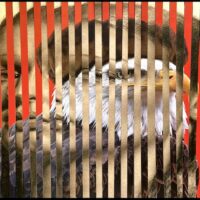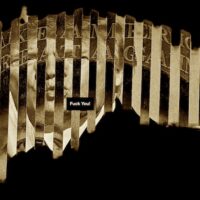And what does she suspect?
Yes, you guessed it.
Skulduggery of course.
In St. Gallen, Switzerland
They Love Books . . . Even American Poetry
One pleasure of walking the streets of St. Gallen, a town near the foothills of the Swiss Alps, was climbing its steep alleys and staircases through winding passages, and then, surprisingly, coming upon a kiosk that advertised the Wortlaut literary festival, where I would be reading alongside the American poet Jan Heller Levi.
Poetry and Music at the Palace in St. Gallen
They like poetry in Switzerland. Our readings went really well, and we had an enthusiastic crowd.
Not a Ghost of a Chance
Launching a trade war with his tariffs, he tanked the markets and sent his favorite message.
Seeking to Sue the NYPD
Noted Author Richard Kostelanetz Writes . . .
“On 9 May 2024, five days before my 84th birthday, twelve NYPD raided my studio/home in Queens, NY, looking initially for printed child pornography, following the receipt of a few mostly innocuous images from a book written by someone else that I tried to publish through Amazon KDP. Finding nothing in my collection of 25,000 books, they then filched all my MAC computers and backups — my lifework as a writer & artist — that I neglected to store externally. … [He has since learned that he’s not “a person of interest,” meaning he’s not suspected of a crime.] The NYPD still has invaluable material ten months later destroying my professional career. … I’d like to sue them for the return of my work and professional damages incurred.”
Kostelanetz is seeking an attorney to press his case.
Jim Jarmusch Talks About Kenneth Koch
The indie filmmaker was one of many notable speakers at “Kenneth Koch at 100: A Celebration,” held last month at The New School’s Auditorium in Greenwich Village. Kenneth Koch was Jarmusch’s teacher at Columbia, “a kind of godfather to me, aesthetically,” he said, noting further that the “so-called New York School of poets in general remain as my godparents in almost anything I create.” Among the more interesting tributes were Maxine Groffsky’s and, via video, Alex Katz’s. I found Jarmusch’s the most amusing.
Thinking of Gregory Corso’s ‘Happy Birthday of Death’
Not ready for his closeup.
Musk and His Chainsaw Are Still Coming for You
You think DOGE is gone? He’s still here! And so is his chainsaw!
Proposal for a Billboard
The tag team of Elon Musk and Donald Trump were cheered ringside by MAGA Republicans during el presidente’s speech to the joint session of Congress.
Awards Mean Little Beyond Publicity
Are awards the staff of life? Of course not. But they certainly seem like food for the hungry.
You Are All Deleted. You Are Deleted Forever.
AGITPROP PROPOSAL FOR A BILLBOARD: To be deleted is not a matter of the Internet. It’s a matter of reality.
The White House
Color it brown.
Double Trouble: Bacon Sometimes Meets Picasso
This is what happens when you take a razor to a pair of images cutting them up in vertical strips. And this is what happens when the procedure is applied to a single image, then doubling the result upon itself. Jiří Kolář gave the name “rollage” to this kind of minimalist collage technique.
My Books
Several books of poems are published by Moloko Print and Stadtlichter Presse in bilingual (American-German) editions, and by Cold Turkey Press in handmade chapbooks. “The Z Collection” appeared in three editions, by AC Books, Blue Wind Press, and Moloko Print.”
More Resonant Than Ever
Heathcote Williams’s ‘The United States of Porn’
Heathcote was always prescient. But it is still astonishing to realize how relevant — and resonant — his dissident voice remains more than a dozen years after he recorded “The United States of Porn.”
Steff Signer / Cabinet Music — Frozen Duck Tears
Concept & Music Vocals & Moniphonium Inventions:
Steff Signer, Switzerland
Photography: Mario Baronchelli, Switzerland
«Mother of Transgression» Poetry: Florian Vetsch
Brass Instruments & Tibetan: «singi»
Cymbals: Markus Breuss, Spain
Electric Guitar Explosion: Chanan Hanspal, England
Viola: David Schnee
Recitation Text: Liz Foulis, Scotland
Recitation Poetry: Jaswant Hanspal
Poetry & Prose
‘Wortlaut’ Saint Gallen Festival Salutes the Word
UPDATED: Jan Heller Levi & Jan Herman will appear on March 30, 2025 at the festival, where they will read and discuss their latest poems with Giovanna Caggiano and Julia Mülli from the Kantonsschule am Burggraben. Florian Vetsch will also read with Jan & Jan at the Palace on April 1.















![Heathcote Williams [photo: JH]](https://www.artsjournal.com/herman/wp/wp-content/uploads/2015/06/heathcote-williams-photo-280-200x200.jpg)

